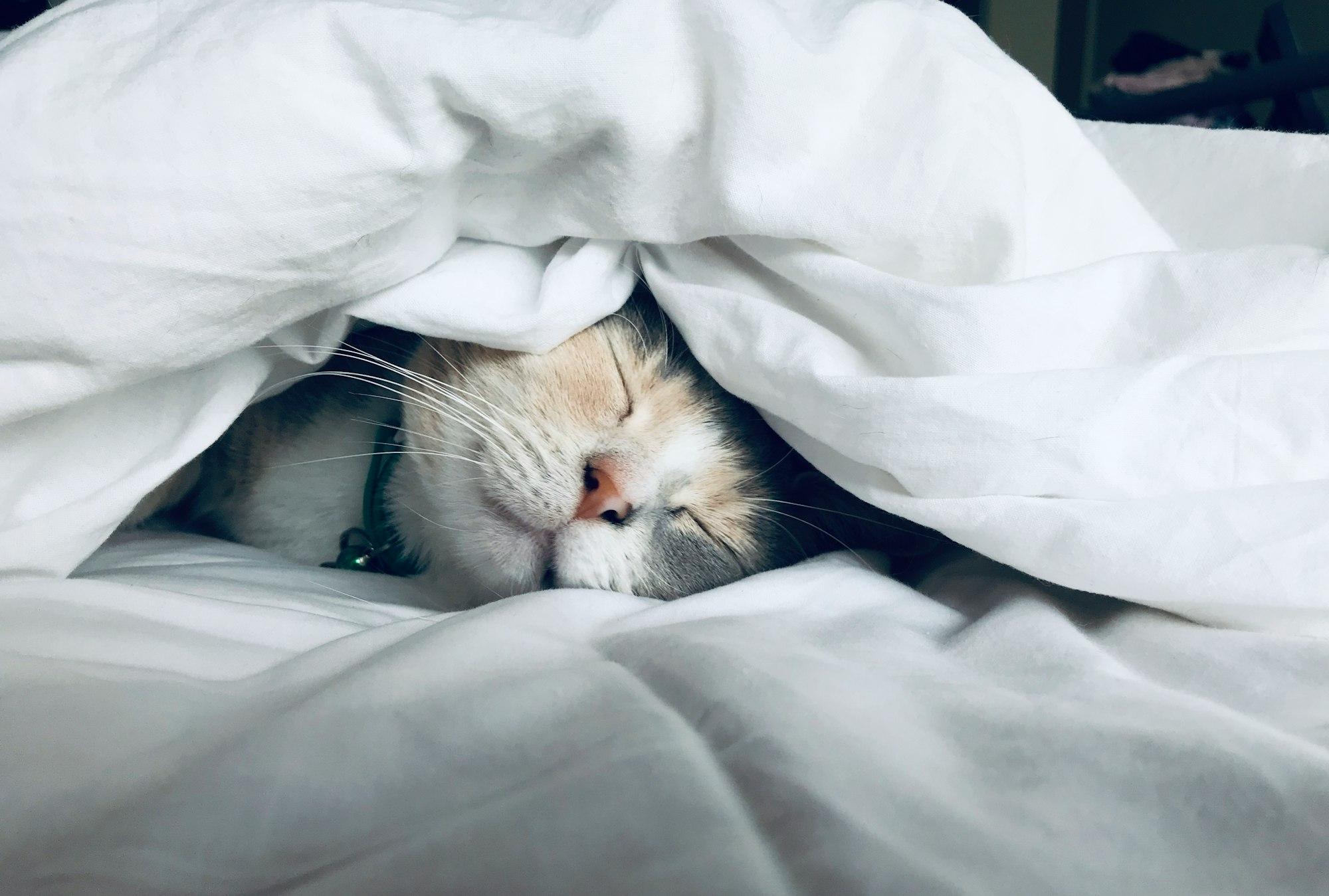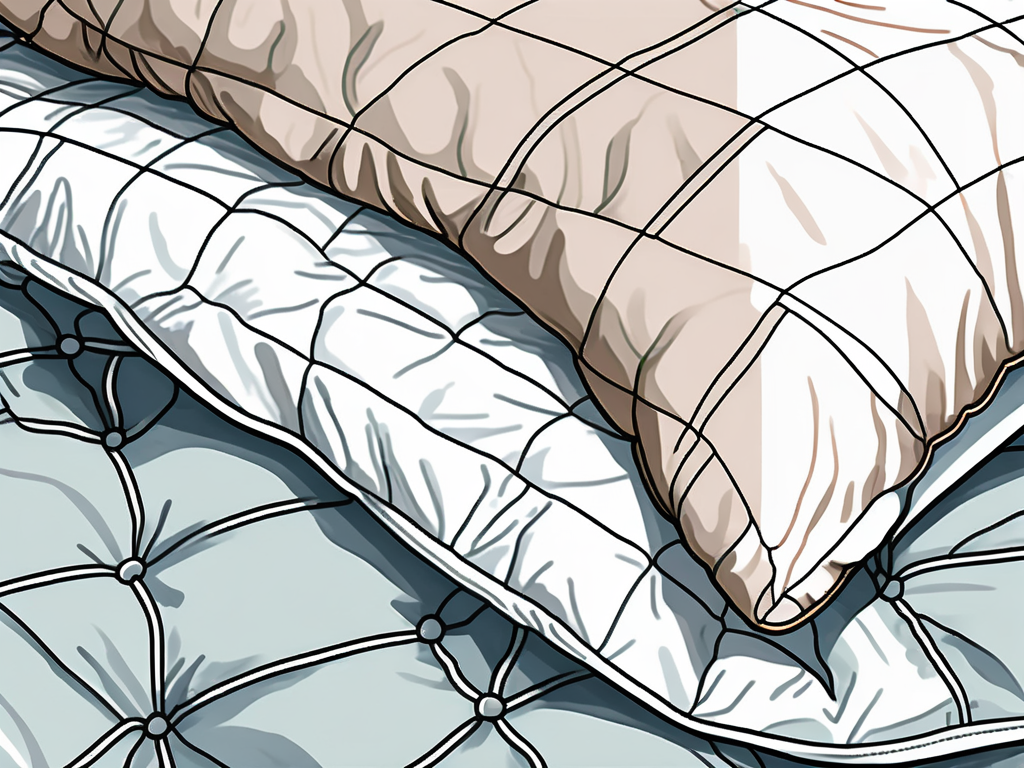Duvet vs. Comforter: What's the Difference?
From warmth and maintenance to aesthetics and versatility, discover which option best suits your sleep preferences and lifestyle.

If you've ever shopped for bedding, you've likely come across the terms "duvet" and "comforter." While both are common choices for keeping warm and cozy during the night, they have distinct differences that set them apart. In this article, we will demystify the duvet and comforter, exploring their history, benefits, and drawbacks. By the end, you'll have a clear understanding of which option is best suited for your needs.
Demystifying the Duvet: Everything You Need to Know
Let's start by diving into the world of duvets. Duvets have a rich history that dates back centuries and were originally used in Europe. Their design consists of a soft, flat bag filled with feathers, down, wool, or a synthetic alternative. Duvets are typically white in color, but modern variations offer a range of patterns and colors to suit various tastes.
The History of Duvets and Their Evolution
The concept of duvets originated in rural Europe, where they were primarily used to combat the harsh winters. Over time, they gained popularity and eventually found their way into homes worldwide. Today, duvets are available in different sizes, including twin, queen, and king, making it easy to find the perfect fit for any bed. Additionally, duvet covers, which act as protective shells that encase the duvet, have become a popular accessory for both decorative and functional purposes.
As duvets evolved over time, different cultures put their own spin on this bedding essential. In Japan, for example, the traditional duvet is known as a "futon," which is a thin mattress that can be folded and stored away during the day. The Scandinavian countries have also made their mark on duvet design with the introduction of the "hygge" concept, focusing on creating a cozy and comfortable sleeping environment.
Furthermore, the filling of duvets has seen advancements with the introduction of innovative materials such as bamboo fibers and microfiber. These alternatives provide hypoallergenic options for individuals with sensitivities while maintaining the plushness and warmth associated with traditional duvets. With sustainability in mind, eco-friendly duvets made from organic cotton or recycled materials are gaining popularity, catering to consumers looking for environmentally conscious bedding choices.
Unraveling the Mystery of Comforters
Now, let's turn our attention to comforters. Comforters, like duvets, are designed to provide warmth and comfort during sleep. However, they differ in construction and appearance. Comforters are typically thick, quilted blankets filled with synthetic fibers, down, or a blend of both. Unlike duvets, comforters come in a variety of colors, patterns, and designs, making them a versatile choice for any bedroom decor.

When it comes to selecting the perfect comforter for your bed, there are a few factors to consider. The fill power of a comforter, which measures the quality and insulating ability of the down or synthetic filling, is an important consideration. A higher fill power indicates a warmer and fluffier comforter. Additionally, the thread count of the comforter's outer fabric can affect its softness and durability. A higher thread count typically results in a smoother and more luxurious feel.
Types of Comforters and Their Benefits
Comforters come in various types, including down comforters, which are known for their exceptional insulation and lightness. They provide a cozy sleeping experience without feeling too heavy or bulky. Synthetic-filled comforters, on the other hand, are a budget-friendly option and are hypoallergenic, making them suitable for individuals with allergies.
For those seeking a more sustainable option, there are eco-friendly comforters available that are made from organic materials such as cotton or bamboo. These comforters are not only gentle on the environment but also offer breathability and moisture-wicking properties, ensuring a comfortable night's sleep. With a wide range of comforter types to choose from, you can find the perfect one to suit your preferences and needs.
Decoding the Duvet vs. Comforter Debate
Now that we have a better understanding of both duvets and comforters, let's explore the pros and cons of each to help you make an informed choice.

Pros and Cons of Duvets and Comforters
When it comes to duvets, one of the key advantages is their versatility. Since duvets can be easily inserted and removed from their covers, they are simple to clean and maintain. Duvets also offer customizable warmth since you can choose a duvet with your preferred level of fill, allowing you to adjust its insulation based on the season.
On the downside, duvets often require a separate cover, which adds to the overall cost. Additionally, some users may find that duvets shift around within their covers, requiring occasional readjustment.
Comforters, on the other hand, provide a convenient all-in-one solution. Their quilted design ensures that the filling remains evenly distributed across the entire blanket, eliminating the need for readjustment. Comforters, especially down comforters, also offer excellent insulation, making them cozy during cold nights.
A potential drawback of comforters is their weight and bulkiness. Some individuals may find them too heavy, particularly if they prefer a lighter covering during sleep. Additionally, cleaning comforters can be more challenging due to their size and lack of a removable cover.
When it comes to choosing between a duvet and a comforter, it's essential to consider your personal preferences and sleeping habits. If you tend to get cold easily and enjoy the ability to adjust your bedding's warmth level, a duvet might be the perfect choice for you. On the other hand, if you prefer a low-maintenance option that provides consistent warmth and coziness, a comforter could be the way to go.

Another factor to keep in mind is the aesthetic appeal of your bedding. Duvets often come in a wide range of colors, patterns, and textures, allowing you to change up the look of your bedroom easily. Comforters also offer various design options, from simple solid colors to intricate quilting patterns, giving you the opportunity to showcase your style and personality through your bedding choice.
Choosing Between a Duvet and Comforter Made Easy
Now that we've explored the characteristics of duvets and comforters, how do you decide which one is right for you? Consider the following factors:
Factors to Consider When Selecting Bedding
- Climate: If you live in a region with fluctuating temperatures, a duvet's customizable warmth may be preferable. In consistently colder or warmer climates, a comforter may be the more suitable choice.
- Personal Preferences: Does the weight and feel of your bedding significantly impact your sleep quality? Some individuals enjoy the lightness of a duvet, while others prefer the all-encompassing warmth of a comforter.
- Budget: Consider your budget and the long-term costs associated with each option. Keep in mind that duvets often require separate covers, whereas comforters are standalone.
- Allergies: If allergies are a concern, opt for a hypoallergenic comforter or duvet, designed to minimize allergen accumulation.
- Aesthetics: Finally, think about the overall look and feel you want to achieve in your bedroom. Consider the various patterns, colors, and designs available for both duvets and comforters.
By assessing these factors, you can narrow down your choices and find the perfect bedding solution for your specific needs and preferences.
When it comes to climate, it's important to consider the unique weather patterns of your region. If you live in a place where the temperatures can fluctuate drastically throughout the year, a duvet's customizable warmth is a great advantage. With a duvet, you can easily adjust the level of insulation by adding or removing inserts, ensuring that you stay comfortable no matter the season. On the other hand, if you reside in a consistently colder or warmer climate, a comforter may be the more suitable choice. Its fixed insulation provides a reliable level of warmth without the need for adjustments.
Personal preferences play a significant role in determining the right bedding for you. Some individuals find that the lightness of a duvet allows for a more restful sleep, as it provides a cozy yet breathable cover. Others, however, prefer the all-encompassing warmth of a comforter, which can make them feel like they're being enveloped in a cloud of softness. Consider how the weight and feel of your bedding impact your sleep quality, and choose accordingly.
While budget is an important consideration for many, it's essential to think beyond the initial cost and consider the long-term expenses associated with each option. Duvets often require separate covers, which can add to the overall cost. On the other hand, comforters are standalone and do not require additional covers. By carefully evaluating your budget and weighing the pros and cons of each choice, you can make an informed decision that aligns with your financial goals.

If you suffer from allergies, it's crucial to select bedding that minimizes allergen accumulation. Both duvets and comforters offer hypoallergenic options that are specifically designed to reduce the presence of allergens such as dust mites, pet dander, and pollen. These hypoallergenic bedding choices provide a healthier sleep environment, allowing you to wake up refreshed and allergy-free.
Finally, aesthetics play a significant role in creating the desired ambiance in your bedroom. Both duvets and comforters come in a wide range of patterns, colors, and designs, allowing you to choose the one that complements your bedroom decor. Whether you prefer a minimalist and modern look or a cozy and traditional feel, there is a bedding option that will perfectly match your aesthetic vision.
By considering these factors, you can confidently make a choice that will transform your sleep experience into a cozy and comforting retreat every night. So go ahead, explore the options, and find the perfect bedding that suits your needs, preferences, and style.
Discover identical bedding options sold under different names and prices, and choose the one that fits your budget and style. With Spoken, you can easily compare prices and detailed product information, including historical pricing trends, to ensure you're making a smart, balanced purchasing decision. Don't miss out on cozy comfort at the best price – Check out products on Spoken today and transform your sleep experience.
Quick facts
Is it better to get a comforter or duvet?
The choice between a comforter and duvet depends on personal preference. Duvets are easier to clean as you wash the cover, not the insert. They're also more versatile for changing decor. Comforters are often cheaper and ready to use out of the package. Consider your climate, laundry habits, and desired aesthetic when choosing.
Can a duvet be used as a comforter?
Yes, a duvet can be used as a comforter. A duvet insert without a cover functions similarly to a comforter. However, duvets are designed to be used with a cover for easy cleaning and style changes. Using a duvet without a cover may lead to more frequent washing of the entire insert.
What is the difference between a comforter and a duvet?
A comforter is a single, ready-to-use bedding piece, while a duvet is an insert designed to be used with a removable cover for easier cleaning and customization.
What is the point of having a duvet?
A duvet offers flexibility, as its cover can be easily removed and washed or swapped to match changing decor styles. It also provides warmth and comfort.
What does duvet mean?
The word 'duvet' comes from French and means 'down,' referring to the soft filling traditionally used in duvets.
Is a blanket a duvet?
No, a blanket is a single-layer bedding item, while a duvet consists of an insert and a removable cover, designed for layering and warmth.
What is the difference between duvet covers and comforters?
A duvet cover encases a duvet insert and is removable for cleaning, while a comforter is a single, stitched piece that requires whole-item laundering.
Can you use a duvet cover on a regular comforter?
Yes, a duvet cover can be used on a regular comforter, but it may not fit perfectly, and the comforter might shift inside without corner ties.
Why do Americans use comforters instead of duvets?
Americans often prefer comforters for their simplicity, as they come pre-assembled and ready to use, unlike duvets that require separate covers.
What is the point of a duvet cover?
A duvet cover protects the duvet insert, making it easier to clean and allowing for quick style changes without replacing the entire bedding.
What size should a king size duvet cover be?
A king-size duvet cover typically measures around 104 x 90 inches, but exact dimensions can vary, so always check the label for compatibility.
Should a duvet cover be the same size as the duvet?
Yes, a duvet cover should match the duvet's dimensions for a snug fit, ensuring the insert stays evenly distributed inside.
How far should a duvet hang down?
A duvet should hang down 6-12 inches on each side of the bed, depending on the mattress thickness and desired look.

Anirudh Atodaria
Software Engineer at Spoken
Anirudh is a software engineer at Spoken. He enjoys learning new things and solving complex problems. He takes pride in making others lives easier through innovative technology solutions. While he spends most of his time immersed in coding and tech, he tries to touch some grass occasionally.
Read more

